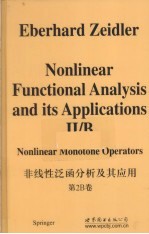图书介绍
非线性泛函分析及其应用 第2B卷 非线性单调算子 英文版PDF|Epub|txt|kindle电子书版本下载

- (德)宰德勒著 著
- 出版社: 世界图书广东出版公司
- ISBN:9787510005213
- 出版时间:2009
- 标注页数:1202页
- 文件大小:21MB
- 文件页数:748页
- 主题词:非线性-泛函分析-英文;非线性算子:单调算子-英文
PDF下载
下载说明
非线性泛函分析及其应用 第2B卷 非线性单调算子 英文版PDF格式电子书版下载
下载的文件为RAR压缩包。需要使用解压软件进行解压得到PDF格式图书。建议使用BT下载工具Free Download Manager进行下载,简称FDM(免费,没有广告,支持多平台)。本站资源全部打包为BT种子。所以需要使用专业的BT下载软件进行下载。如BitComet qBittorrent uTorrent等BT下载工具。迅雷目前由于本站不是热门资源。不推荐使用!后期资源热门了。安装了迅雷也可以迅雷进行下载!
(文件页数 要大于 标注页数,上中下等多册电子书除外)
注意:本站所有压缩包均有解压码: 点击下载压缩包解压工具
图书目录
GENERALIZATION TO NONLINEAR STATIONARY PROBLEMS469
Basic Ideas of the Theory of Monotone Operators471
CHAPTER 25 Lipschitz Continuous,Strongly Monotone Operators,the Projection-Iteration Method,and Monotone Potential Operators495
25.1.Sequences of k-Contractive Operators497
25.2.The Projection-Iteration Method for k-Contractive Operators499
25.3.Monotone Operators500
25.4.The Main Theorem on Strongly Monotone Operators,and the Projection-Iteration Method503
25.5.Monotone and Pseudomonotone Operators,and the Calculus of Variations506
25.6.The Main Theorem on Monotone Potential Operators516
25.7.The Main Theorem on Pseudomonotone Potential Operators518
25.8.Application to the Main Theorem on Quadratic Variational Inequalities519
25.9.Application to Nonlinear Stationary Conservation Laws521
25.10.Projection-Iteration Method for Conservation Laws527
25.11.The Main Theorem on Nonlinear Stationary Conservation Laws535
25.12.Duality Theory for Conservation Laws and Two-sided aposteriori Error Estimates for the Ritz Method537
25.13.The Ka?arov Method for Stationary Conservation Laws542
25.14.The Abstract Ka?anov Method for Variational Inequalities545
CHAPTER 26 Monotone Operators and Quasi-Linear Elliptic Differential Equations553
26.1.Hemicontinuity and Demicontinuity554
26.2.The Main Theorem on Monotone Operators556
26.3.The Nemyckii Operator561
26.4.Generalized Gradient Method for the Solution of the Galerkin Equations564
26.5.Application to Quasi-Linear Elliptic Differential Equations of Order 2m567
26.6.Proper Monotone Operators and Proper Quasi-Linear Elliptic Differential Operators576
CHAPTER 27 Pseudomonotone Operators and Quasi-Linear Elliptic Differential Equations580
27.1.The Conditions(M)and(S),and the Convergence of the Galerkin Method583
27.2.Pseudomonotone Operators585
27.3.The Main Theorem on Pseudomonotone Operators589
27.4.Application to Quasi-Linear Elliptic Differential Equations590
27.5.Relations Between Important Properties of Nonlinear Operators595
27.6.Dual Pairs of B-Spaces598
27.7.The Main Theorem on Locally Coercive Operators598
27.8.Application to Strongly Nonlinear Differential Equations604
CHAPTER 28 Monotone Operators and Hammerstein Integral Equations615
28.1.A Factorization Theorem for Angle-Bounded Operators619
28.2.Abstract Hammerstein Equations with Angle-Bounded Kernel Operators620
28.3.Abstract Hammerstein Equations with Compact Kernel Operators625
28.4.Application to Hammerstein Integral Equations627
28.5.Application to Semilinear Elliptic Differential Equations632
CHAPTER 29 Noncoercive Equations,Nonlinear Fredholm Alternatives,Locally Monotone Operators,Stability,and Bifurcation639
29.1.Pseudoresolvent,Equivalent Coincidence Problems,and the Coincidence Degree643
29.2.Fredholm Alternatives for Asymptotically Linear,Compact Perturbations of the Identity650
29.3.Application to Nonlinear Systems of Real Equations652
29.4.Application to Integral Equations653
29.5.Application to Differential Equations653
29.6.The Generalized Antipodal Theorem654
29.7.Fredholm Alternatives for Asymptotically Linear(S)-Operators657
29.8.Weak Asymptotes and Fredholm Alternatives657
29.9.Application to Semilinear Elliptic Differential Equations of the Landesman-Lazer Type661
29.10.The Main Theorem on Nonlinear Proper Fredholm Operators665
29.11.Locally Strictly Monotone Operators677
29.12.Locally Regularly Monotone Operators,Minima,and Stability679
29.13.Application to the Buckling of Beams697
29.14.Stationary Points of Functionals706
29.15.Application to the Principle of Stationary Action708
29.16.Abstract Statical Stability Theory709
29.17.The Continuation Method712
29.18.The Main Theorem of Bifurcation Theory for Fredholm Operators of Variational Type712
29.19.Application to the Calculus of Variations722
29.20.A General Bifurcation Theorem for the Euler Equations and Stability730
29.21.A Local M ultiplicity Theorem733
29.22.A Global Multiplicity Theorem735
GENERALIZATION TO NONLINEAR NONSTATIONARY PROBLEMS765
CHAPTER 30 First-Order Evolution Equations and the Galerkin Method767
30.1.Equivalent Formulations of First-Order Evolution Equations767
30.2.The Main Theorem on Monotone First-Order Evolution Equations770
30.3.Proof of the Main Theorem771
30.4.Application to Quasi-Linear Parabolic Differential Equations of Order 2m779
30.5.The Main Theorem on Semibounded Nonlinear Evolution Equations783
30.6.Application to the Generalized Korteweg-de Vries Equation790
CHAPTER 31 Maximal Accretive Operators,Nonlinear Nonexpansive Semigroups,and First-Order Evolution Equations817
31.1.The Main Theorem819
31.2.Maximal Accretive Operators820
31.3.Proof of the Main Theorem822
31.4.Application to Monotone Coercive Operators on B-Spaces827
31.5.Application to Quasi-Linear Parabolic Differential Equations829
31.6.A Look at Quasi-Linear Evolution Equations830
31.7.A Look at Quasi-Linear Parabolic Systems Regarded as Dynamical Systems832
CHAPTER 32 Maximal Monotone Mappings840
32.1 Basic Ideas843
32.2.Definition of Maximal Monotone Mappings850
32.3.Typical Examples for Maximal Monotone Mappings854
32.4.The Main Theorem on Pseudomonotone Perturbations of Maximal Monotone Mappings866
32.5.Application to Abstract Hammerstein Equations873
32.6.Application to Hammerstein Integral Equations874
32.7.Application to Elliptic Variational Inequalities874
32.8.Application to First-Order Evolution Equations876
32.9.Application to Time-Periodic Solutions for Quasi-Linear Parabolic Differential Equations877
32.10.Application to Second-Order Evolution Equations879
32.11.Regularization of Maximal Monotone Operators881
32.12.Regularization of Pseudomonotone Operators883
32.13.Local Boundedness of Monotone Mappings884
32.14.Characterization of the Surjectivity of Maximal Monotone Mappings886
32.15.The Sum Theorem888
32.16.Application to Elliptic Variational Inequalities892
32.17.Application to Evolution Variational Inequalities893
32.18.The Regularization Method for Nonuniquely Solvable Operator Equations894
32.19.Characterization of Linear Maximal Monotone Operators897
32.20.Extension of Monotone Mappings899
32.21.3-Monotone Mappings and Their Generalizations901
32.22.The Range of Sum Operators906
32.23.Application to Hammerstein Equations908
32.24.The Characterization of Nonexpansive Semigroups in H-Spaces909
CHAPTER 33 Second-Order Evolution Equations and the Galerkin Method919
33.1.The Original Problem921
33.2.Equivalent Formulations of the Original Problem921
33.3.The Existence Theorem923
33.4.Proof of the Existence Theorem924
33.5.Application to Quasi-Linear Hyperbolic Differential Equations928
33.6.Strong Monotonicity,Systems of Conservation Laws,and Quasi-Linear Symmetric Hyperbolic Systems930
33.7.Three Important General Phenomena934
33.8.The Formation of Shocks935
33.9.Blowing-Up Effects937
33.10.Blow-Up of Solutions for Semilinear Wave Equations944
33.11.A Look at Generalized Viscosity Solutions of Hamilton-Jacobi Equations947
GENERAL THEORY OF DISCRETIZATION METHODS959
CHAPTER 34 Inner Approximation Schemes,A-Proper Operators,and the Galerkin Method963
34.1.Inner Approximation Schemes963
34.2.The Main Theorem on Stable Discretization Methods with Inner Approximation Schemes965
34.3.Proof of the Main Theorem968
34.4.Inner Approximation Schemes in H-Spaces and the Main Theorem on Strongly Stable Operators969
34.5.Inner Approximation Schemes in B-Spaces972
34.6.Application to the Numerical Range of Nonlinear Operators974
CHAPTER 35 External Approximation Schemes,A-Proper Operators,and the Difference Method978
35.1.External Approximation Schemes980
35.2.Main Theorem on Stable Discretization Methods with External Approximation Schemes982
35.3.Proof of the Main Theorem984
35.4.Discrete Sobolev Spaces985
35.5.Application to Difference Methods988
35.6.Proof of Convergence990
CHAPTER 36 Mapping Degree for A-Proper Operators997
36.1.Definition of the Mapping Degree998
36.2.Properties of the Mapping Degree1000
36.3.The Antipodal Theorem for A-Proper Operators1000
36.4.A General Existence Principle1001
Appendix1009
References1119
List of Symbols1163
List of Theorems1174
List of the Most Important Definitions1179
List of Schematic Overviews1182
List of Important Principles1183
Index1189